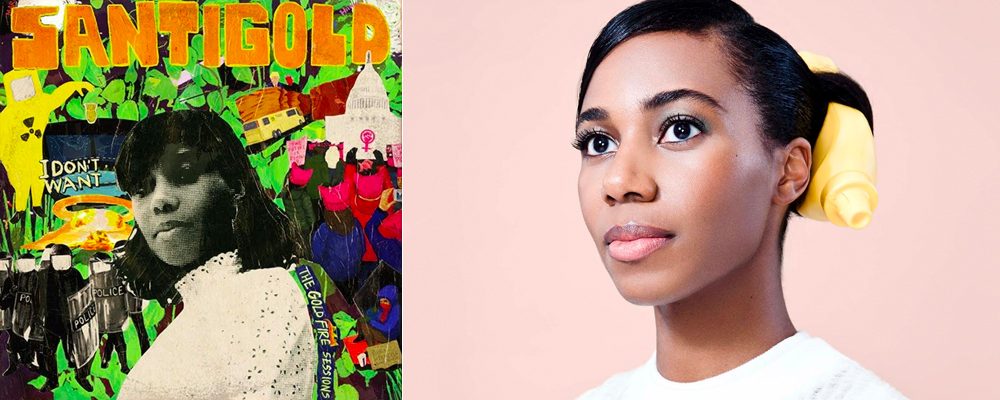Santigold Hones Her Signature Sound on Surprise Summer Album ‘I Don’t Want: The Gold Fire Sessions’
Adi Mehta
Since her 2008 debut Santigold has crafted consistently catchy tunes that hop genres with a unique, effortless grace. Her signature strain of pop is heavily rooted in dancehall, along with elements of indie rock, new wave, electronic, and hip-hop. The Philadelphia native has just returned with surprise release, “I Don’t Want: The Gold Fire Sessions.” Initially conceived as a mixtape, it retains the casual feel of such an undertaking, but has ended up a proper album in its own right, a welcome and summery release.
Opener “Coo Coo Coo” brings things to a sunny start with frenetic, Afro-Caribbean percussion, steel drums, and the nonsensical titular sounds setting a lighthearted mood. The transitions between tracks are seamless, in the style of a mixtape, and the segue into “Run the Road,” when party sirens and a hard, hip-hop beat take over, is a particularly exhilarating moment. One feature that often sets apart exceptional singers from the flocks of disposable ones is an effective multiplicity of voices, something that Santigold has certainly got down. From her first note in the second song, she has donned an entirely different persona. Here, she’s arguably in her most memorable mode, with all her most charming vocal idiosyncrasies on display. Her sonorous, mellifluous voice is undeniably distinctive and powerful.
“Wha’ You Feel Like” is a hype, dancehall number, with Santigold donning yet another voice, this one, at times, rather gratingly nasal. Still, it’s a fun, propulsive track, recalling the sounds of Major Lazer. “I Don’t Want” is a delightfully mellow number, breathy and spacious, with a catchy, helium falsetto chorus pulled off effortlessly. Standout track “Valley of the Dolls” is a bouncy, subdued, reggae-tinged cut with an instantly infectious chorus that showcases Santigold’s remarkable knack for stringing together snippets that stick. “Why Me” brings back the dancehall, and finds Santi keeping things interesting, this time singing halfway between her general “pop” voice and her “reggae” voice. She has often professed her love for her “ultimate favorite band,” Devo, whose influence seeps in slightly here, with busy ‘80s-style percussion.
“Crashing Your Party” is another immediately catchy tune, with insistent handclaps, cartoonish wah-wah synth sounds, and colorful sound candy. Santigold’s high-pitched singing here sounds a bit strained, relatively speaking, but you’ve got to hand it to her for her versatility. “Don’t Blame Me” brings more lazers and sirens, some dirty bass, and feisty, full-bodied vocals courtesy of featured guest Shenseea, who makes it the most legit dancehall number of the album by far. “A Perfect Life” is glimmering reggae pop, with a ridiculously fetching, synth-laden choruses. There are echoes of Bad Brains’ H.R. in the singing here — something of a stupendous feat, as almost any fans of that band would agree that no one sounds like H.R. At other fleeting moments, Santi’s girly, effervescent delivery recalls Gwen Stefani in her No Doubt days.
Santigold has co-written songs for the likes of Lily Allen, Christina Aguilera, and Ashlee Simpson, and although she has received considerable, well-deserved acclaim for her solo output, she can surely attest to the relatively thankless experience of being the often-overlooked woman behind the scenes. Considering that she started off in a punk band, and has cited The Smiths as an all-time favorite, history could have easily taken a different course, with pent-up industry-directed bitterness devolving into paroxysms of rage. Somehow, she has managed to keep her mind in the right place, always sounding effervescent, and the new songs abound with lyrics that put things in a positive perspective. It’s the same attitude she expressed regarding her 2015 single “Radio,” which explored self-absorption in the millenial age, saying, “It can be dark and haunting and tricky, and freak us out, but it can be also be silly and fun and we can learn to play with it.”
Some of the most overtly dancehall moments are delivered partly in Patois, largely indecipherable to all but Jamaicans, but clear enough to get the point across. The prevailing theme is along the lines of “look how hot I am,” but in a way that rings more playful than arrogant. Peppered throughout are nuggets of wisdom about proper priorities. In “Coo Coo Coo,” Santigold asserts, “I don’t care about your money, clout, hair / You can keep your cat call and get out of my way.” In “Run the Road,” she expands on her modest sources of satisfaction, declaring, “I believe in the rhythm of the road / I don’t got a need for so much more.” In “I Don’t Want,” she expands, “I don’t even want none / Let them think they won.” As she reasons, in “Valley of the Dolls,” “I could try to walk away / Or just win the game they play.” With so much radio fodder preoccupied with vapid claims of status, Santigold’s cool composure is a breath of fresh air. The sentiment of unphased, empowered determination reaches its most emphatic on “Crashing Your Party,” and in the closer, “Gold Fire,” upon the notification, “I’m ‘a run a ring round your nothing.”
One notable strength of “I Don’t Want: The Gold Fire Session” is how it manages to sound centered, while spanning so many styles. Artists who draw from such especially eclectic influences often turn out music too forced and patchy to achieve prominent pop punch, but Santigold’s music seems more elegantly focused on every successive release. While the new record might seem like a slightly less thoroughly realized album than the last two, this only ends up being an attribute, as there’s nothing slapdash about it. The seamless continuity of the mixtape-style format imbues the release with a certain breeziness that gives it a character of its own — and as is always the case with Santigold, every constituent song could be a single.
“I Don’t Want: The Gold Fire Sessions” is available July 27 on Apple Music.

